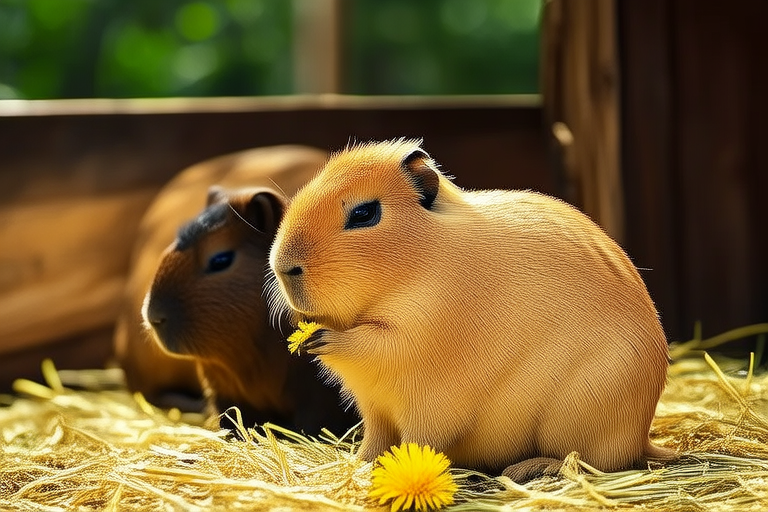Guinea Pigs as Stress Reducers
The hustle and bustle of modern life can be overwhelming, leading many people to seek ways to reduce stress and improve their overall well-being. One increasingly popular method is the adoption of pets, particularly small animals like guinea pigs. These charming creatures have been shown to provide significant emotional support and help individuals manage their stress levels more effectively. This article explores the various ways in which guinea pigs contribute to reducing stress in daily life, highlighting their calming presence, low maintenance care requirements, and social needs that align with human companionship.
The Calming Presence of Guinea Pigs
One of the most immediate benefits of having a guinea pig as a pet is the soothing effect they can have on their owners. The gentle sounds of their chewing, the soft rustling of their fur, and the occasional purring-like noise they make can create a tranquil atmosphere in any household. Research has demonstrated that interacting with animals, especially those with calm demeanors, can lower blood pressure, heart rate, and cortisol levels—the hormone associated with stress. A study published in the Journal of Veterinary Behavior found that participants who spent time petting and playing with guinea pigs experienced reduced anxiety and improved mood compared to those who did not interact with the animals.
Low Maintenance Care Requirements
Another reason why guinea pigs are excellent pets for stressed individuals is their relatively low maintenance care requirements. Unlike larger pets such as dogs or cats, guinea pigs do not require extensive grooming or daily walks. Their primary needs include a clean living environment, fresh water, hay, pellets, and occasional treats. Cleaning their cage once or twice a week and providing them with a few hours of supervised playtime outside of their enclosure each day is usually sufficient. This simplicity allows busy individuals to enjoy the company of a pet without feeling overwhelmed by the responsibilities.
Social Needs That Align With Human Companionship
Guinea pigs are naturally social animals that thrive when kept in pairs or groups. They form strong bonds with one another and can also develop close relationships with humans. Many owners report that their guinea pigs respond positively to gentle handling, vocalization, and even simple gestures of affection. These interactions can foster a sense of connection between owner and pet, further enhancing the emotional benefits of pet ownership. In fact, a study conducted by the University of California, Davis, revealed that participants who owned guinea pigs felt more connected to their pets than those who owned other types of small animals, such as hamsters or gerbils.
Scientific Insights on Pet Ownership for Mental Health
Research has consistently shown that owning a pet, particularly one that provides consistent companionship and affection, can have numerous positive effects on mental health. Pets offer unconditional love, companionship, and a sense of purpose, all of which can help alleviate feelings of loneliness, depression, and anxiety. Moreover, caring for an animal can provide structure and routine to daily life, contributing to a greater sense of stability and control. According to a review published in the PLOS ONE journal, pet owners tend to experience lower levels of psychological distress and higher levels of life satisfaction compared to non-pet owners.
Anecdotes and Studies Involving Guinea Pigs
Several anecdotal accounts and scientific studies illustrate the therapeutic potential of guinea pigs. For instance, a case study reported in the Journal of Pediatric Nursing described how a young girl with autism spectrum disorder (ASD) showed improved social interaction skills after spending regular sessions with therapy guinea pigs. The girl, who had previously struggled with communication and social engagement, became more comfortable initiating conversations and participating in group activities following her interactions with the animals. Similarly, a pilot program implemented at a senior living facility found that residents who regularly visited with guinea pigs exhibited increased happiness and decreased symptoms of depression.
Practical Advice for Integrating a Guinea Pig Into a Stress-Prone Lifestyle
If you’re considering adding a guinea pig to your household as a means of managing stress, there are several practical steps you can take to ensure a smooth transition. First, it’s important to research and understand the basic needs of guinea pigs before bringing one home. This includes learning about their dietary preferences, housing requirements, and exercise needs. Next, gradually introduce your guinea pig to your living space, allowing them time to acclimate to their new surroundings. Finally, establish a routine that includes regular feeding times, cleaning schedules, and play sessions. By following these guidelines, you can create a nurturing environment for both you and your new furry friend.
Unique Qualities That Make Guinea Pigs Ideal Pets for Promoting Relaxation and Well-Being
Guinea pigs possess several unique qualities that make them particularly well-suited for promoting relaxation and well-being. Their small size and quiet demeanor allow them to coexist peacefully with other pets and family members without causing disruption. Additionally, their expressive faces and playful personalities make them endlessly entertaining to watch. Perhaps most importantly, guinea pigs are highly adaptable creatures capable of forming strong bonds with their human caregivers. Whether you’re looking for a companion to help you unwind after a long day or a source of comfort during challenging times, a guinea pig may be just what you need.
